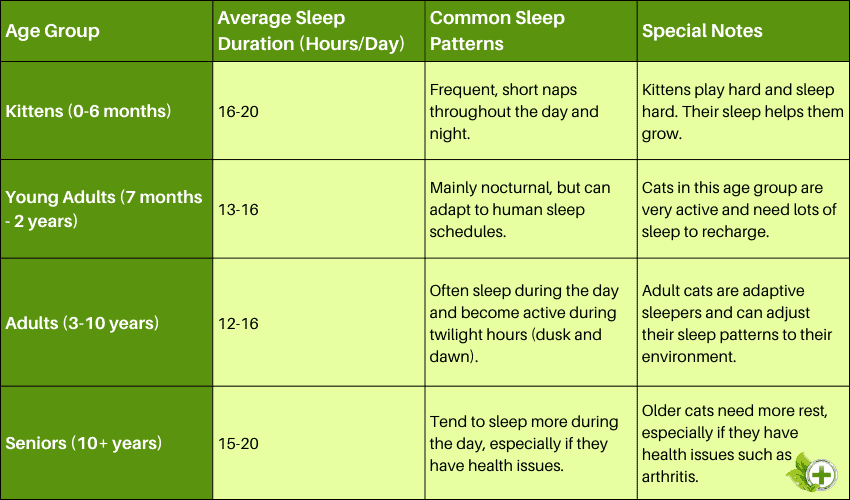Quick Reference
Reasons As To Why Cats Sleep So Much
- Cats Are Crepuscular
- Cats Are Obligate Carnivores
- They Sleep More When They Age
- They Feel Relaxed in their Surrounding
- They're Sick Or In Pain
- Overeating


- Asvin Small Dog Bed for Small Dogs, Cat Beds for Indoor Cats, Pet Bed for Puppy and Kitty, Extra Soft & Machine Washable with Anti-Slip & Water-Resistant Oxford Bottom, Grey, 20 inches

- Love's cabin Round Donut Cat and Dog Cushion Bed, 20in Pet Bed for Cats or Small Dogs, Anti-Slip & Water-Resistant Bottom, Super Soft Durable Fabric Pet beds, Washable Luxury Cat & Dog Bed Gray

- Bedsure Small Dog Bed for Small Dogs Washable - Round Cat Beds for Indoor Cats, Round Pet Bed for Puppy and Kitten with Slip-Resistant Bottom, Camel, 20 Inches
Listen to our quick audio
So, you have a cat, and right now, he is sleeping. Right? Whatever you do, your cat won't care much as he needs to sleep (where? on your lap? XD). You know how some animals have specific times when they sleep and wake up? Well, that can be confusing because they don't sleep all the time like humans do, which is healthier for us.
Cats love to sleep a lot! They usually snooze for about 16 hours every day, which is normal for them. There was a study about cat sleep that says they take short naps instead of sleeping in long stretches as we do. So, if your cat naps all day but seems healthy and happy when awake, you don't need to worry—they're getting enough rest! [1]
Anyway, have you ever wondered why do cats sleep so much?

Why do indoor cats sleep so much?
Cats are crepuscular
When you watch shows about wild animals on channels like Animal Planet or Discovery, you might see wild cats sleeping a lot during the day. And you might wonder if it's because they don't have enough food or if they're lazy. Domesticated cats get enough food but still sleep so much. So are they lazy or what?
The fact is, they sleep so much because they are crepuscular animals, according to USDA Forest Service. In other words, they are most active in the early morning and dusk. [2]
This is the natural hunting time for cats as their prey is asleep during this time, making it easier for them to hunt their prey. While we humans are diurnal (active during the day), cats are nocturnal (active at night). So, when you see your cat sleeping all day, he does what comes to him.
Tip: If your cats stay awake at night, you can break their sleep patterns by playing with them during the day. Observe their sleep patterns and change them. Pet experts say that playing with your cat before the nighttime meal helps a lot.

Cats are obligate carnivores
According to a review of Nutrition of the domestic cat at NLH, cats are carnivore animals. According to that review, they can not digest carbohydrates and other plant-based nutrients. This suggests that cats are obligate carnivores with carnivorous inclinations. [3]
In nature, Carnivores sleep more than herbivores to conserve energy as they spend a lot of time searching for and digesting their food. This is one of the factors that house cats tend to sleep so much, as they are natural predators and need to spend a lot of energy to digest their food.

They sleep more when they age
As cats get older, they tend to sleep more than when they were younger. A study looked at older cats, especially those 11 years and above, and found that they have some changes in their behavior. These older cats sleep more and might sometimes get a bit confused about things. [4]
So, if you own adult cats, don't disturb them as they need more sleep as they age. Additionally, you can help them by giving supplements daily. For this, we recommend reading MaryRuth Organics Herbal Supplement Drops.
They feel relaxed in their surrounding
Generally, relaxed when we are at home. That is because it is the only place we have the freedom to do anything. Right? The same goes for cats. When they are raised at home, they tend to sleep a lot (because that's what they love to do).
According to a study of Behaviour and Ecology of Free-ranging Female Farm Cats, farm cats slept for 40% of the time, usually at night. During the day, they spent 22 percent of their time relaxing. This is because they had the freedom to do anything they wanted. [5]
In a study from 2007, they looked at how shelter cats behave when they're in cages. The study found that these cats were awake or bothered about 70% of the time, and they slept for only 11% of the time. So, this proves that cats also love freedom, like us. And what they love to do is sleep. [6]

They're sick or in pain
Usually, a "cat nap" during the day is a good sign that they are healthy and have lots of energy. If your cat sleeps more than usual and seems tired when it wakes, it may be a sign that they are sick or in pain.
Cats can get sick with different diseases, like we can. Some common cat diseases include Cancer, Diabetes, FIV, Leukemia, Rabies, and Upper Respiratory Infections. [7]
But, it's a good idea to watch how your cat sleeps to learn more about them. Check out how much they sleep each day, if they're active during the evening and night, and if they take long, restful naps or short, disturbed ones during the day. It'll help you understand their sleeping routine and behavior better!
Overeating
If you know Garfield, the lazy cat who loves to sleep and eat, then you know that overeating can make a cat sleepy. [8]
Cats love to eat and will eat as much as possible if you let them. Overeating can make a cat feel sluggish and sleepy.
According to a study of Sleep patterns of the laboratory cat published at the National Library of Medicine, increased food intake increases total sleep duration. So, if your cat is sleeping a lot and seems overweight, it may be because they are eating too much. This is not good for their health, so you should reduce the meal size or the number of meals per day.
Fun Fact
Cats are purr-fect emotional support animals, helping to lower stress and provide companionship! You can learn more about it by reading Can Cats Be Service Animals?
Video
Conclusion
Cats sleep so much because it's their nature. They have an ancestral instinct to conserve energy for hunting, so it's not unusual for them to sleep around 16 hours per day. But, you should observe their sleeping habits, such as how much sleep they get per day, whether they are active in the twilight hours, and if they get deep sleep or disturbed napping times during the day.
Additionally, check their feeding schedules and if they have a medical issue. When in doubt, consult your veterinarian for further guidance.
FAQ
Why Is My Cat Sleeping So Much And Not Eating?
If your pet cat sleeps more than 16 hours a day and does not eat, it may be because they are unwell. Check with your veterinarian to see if there is a medical reason for their excessive sleep and lack of appetite.
Why Do Kittens Sleep So Much?
Pet experts believe that kittens sleep so much because they need extra rest. Their bodies are growing and developing, so they need more sleep than an adult cat.
How Much Do Cats Sleep in Their Life?
On average, a cat sleeps for 16 hours each day. This means that they spend two-thirds of their lives asleep! This varies depending on the age and health of the cat – younger and healthier cats may sleep more than older cats. Kittens also tend to sleep more than adult cats.
References
- Pubmed: Sleep and EEG slow-wave activity in the domestic cat: effect of sleep deprivation
- USDA Forest Service: Feral Cat
- NLH: Nutrition of the domestic cat
- Pubmed: Prevalence of Disease and Age-Related Behavioural Changes in Cats: Past and Present
- WILEY ONLINE LIBRARY: Behaviour and Ecology of Free-ranging Female Farm Cats (Felis catus L.)
- ResearchGate: The effect of hiding enrichment on stress levels and behaviour of domestic cats
- ASPCA: Common Cat Diseases
- National Library of Medicine: Sleep patterns of the laboratory cat
Disclaimer
The information provided on this blog is for informational purposes only and is not intended as a substitute for professional medical advice. Always consult with your doctor or other qualified healthcare provider before making any changes to your health regimen. The author of this blog is not a medical professional and does not claim to be able to diagnose or treat any medical conditions. The information provided on this blog is based on the author's own research and experience, and should not be taken as medical advice.
The author of this blog assumes no responsibility for any errors or omissions in the information provided. The information on this blog is provided on an "as is" basis, and the author does not make any guarantees about its completeness, accuracy, usefulness, or timeliness.

